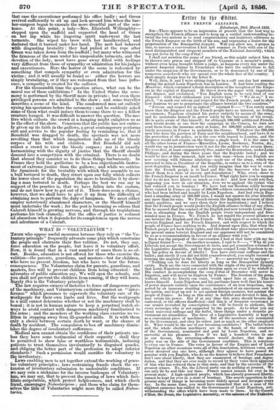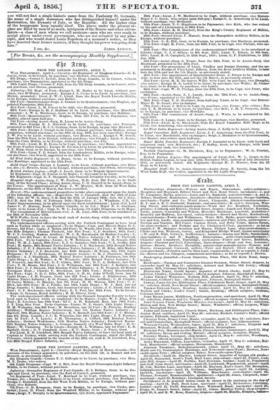Ittirr in fly Odor.
THE FRXNCU ALLIANCE.
_Edinburgh, 29th March 1856.
Bra—There appears to be an impression at present that the best way to strengthen the French alliance and to keep up a cordial understanding be- twixt the two nations is to send congratulatory and laudatory addresses to the French Emperor on the birth of his son, and expressing a desire for the perpetuation of the Bonapartist dynasty. Will you allow me, a propos to this, to narrate a conversation I had last summer in Paris with one of the most distinguished and elequent members of the National Assembly, which was put down by the coup d'etat ?
I shall not mention the name of my friend, as this might subject him to be thrown into prison and shipped off to Cayenne at a moment's notice, without even being brought before a judge, as happens every day under the present Imperial regime to Frenchmen who have the misfortune to fall under the suspicion of the Government, or to be denounced by one of the numerous mouehards who are spread over the whole face of the country. I shall simply design him by the letter S. Well, then, S. and I were sitting together in a cafe one day last summer during the period Louis Napoleon WBA in London. S. had been reading the ifoniteur, which contained a florid description Af the reception of the Empe- ror in the capital of England. He threw down the paper with impatience and disgust, and exclaimed, " You English seem to be very fond of our Emperor : with what enthusiasm you receive him !" " We do so," I re- plied, " to mark our esteem and respect for the French people, and to show how desirous we are to perpetuate the alliance betwixt the two countries." "Esteem and respect for us indeed !" rejoined 8— " You surely must know that the Emperor and the French people have no interest, no feeling in common ; Napoleon obtained his power entirely by means of the army, and he maintains himself in power solely by the 'bayonets of his troops. He is quite aware of this himself; for although 100,000 additional French- men would decide at one blow the campaign in the Crimea, he dare not send them from the immense army at home, for 500,000 soldiers are abso- lutely necessary in France to maintain his throne. Withdraw the 200,000 men who form the garrison of Paris and the neighbourhood, and leave it to the protection of the police, as is the case with regard to London, and the Emperor would not remain on the throne a single week. It is -the same in all the other towns of France—Marseilles, Lyons, Bordeaux, Nantes, &c., would rise up in insurrection were it not for the soldiers who swarm there. We were free, at least comparatively free, under the Restoration, under-Louis Philippe, and during the three years that the Republic lasted ; and we would be free at this moment, had not this man—whom you English are now covering with fulsome adulation—made use of the army, which was intrusted to him as President of the Republic, -to reduce us to a state of the most degrading bondage. And you really imagine that the way te conci- liate the French people is to laud and fête the lourreau who has re- duced them to a state of slavery and degradation ! Why, every cheer to the French Emperor is an insult to France. What right have you to suppose that we do not love liberty as much as you do ? And how would you feel, supposing you were in our situation' were we to applaud the tyrant who had reduced. you to bondage ? We have lost our freedom solely because there existed in France an army of 500,000 soldiers commanded by generals who had been bribed and bought by Louis Napoleon. And had you m Eng- land a standing army of 500,000 men, I would not answer for your liberties any more than for ours. We French esteem the English on account _of their manly qualities' and we envy them their free institutions ; and I believe that the French people would prefer the English alliance to that of any other. But be assured that the conduct of the English just now towards Louis Napo- leon is alienating from the English people every independent and free- minded man in France. We French do not regard the present alliance as one betwixt the English and the French. We look upon it as solely& union betwixt England and the French Emperor, and with respect to which the people of France have nothing to 'do. And depend upon this, that when the French people get back their rights, and this must take place sooner of later, the present union betwixt England and our oppressor will not be considered by us as a recommendation in favour of an alliance with you." Such was the purport of the conversation I had at that time with my in- telligent friend S—. 0:a another occasion, I said to 8—, "Why do you Liberals not accept the Government de facto, and get yourselves returned to the Legislative Assembly, and by that means compel lords Napoleon to re- lax his policy in favour of liberty ? You have universal suaage and the ballot; and surely if you did not hold yourselves aloof, you might succeed in forming the majority in the Chambre." S— answered me by saying— "Nothing can be done for liberty as long as the Bonapartist dynasty exists. Such are the vices connected with the origin of the present Empire, that Louis Napoleon could not confer freedom upon us even if he wished it. His conduct in accomplishing the coup d'Ztat of December will never be forgotten, and will never be forgiven by France.- The freedom of the -press, without which no liberty can exist, would upset him at once. This he knows himself. Louis Napoleon and his partisans know well that his tenure of power depends entirely upon the continuance of an iron despotism, sup- ported by an immense standing army, maintained at an enormous cost -to the nation, and kept up not to act against foreign enemies, but against the people of France. As long as this army is faithful and devoted to him., he may retain his power. But if at any time this army should become dis- contented,, or the officers disaffected—and this is of frequent occurrence in our armies recruited by conscription—he will be forced to abdicate, like every sovereign who is not -supported by the people. As-to-what you say about universal suffrage and the ballot, those things under a despotic go- vernment are absurdities. The farce of a Legislative Assembly is kept up as a convenient piece of machinery. But all the members are nominated by the Government, and obey its orders just as much as the other employes do. What would be the use of our becoming candidates ? The ballot-boxes and the whole election machinery are in the hands of the creatures of the Government, nominated and paid by Louie Napoleon and re- moveable at his pleasure. Even if we bad a hundred votes to one in our favour, the returning-officers would declare that the ma- jority was on the side of the Government candidate. This is notorious to every one in France. The votes in favour of the Empire and of Louis Napoleon on other occasions were all of this description, fictitious votes, and never deceived any one here, although they appear to have passed for genuine with you English, who do us the honour to believe that Frenchmen don't care about liberty, that they are enamoured of bondage and degra- dation and that they are ever ready to record by their votes their approval of him i who has reduced them to that state, and that by the exercise of the grossest crimes. No, Sir, the Liberal party can do nothing at present. We can only lie by and bide our time. France cannot remain for ever in its present state. A high-spirited people, which has already possessed liberty, cannot be kept for ever in a state of bondage. The anode opposition to the present state of things is becoming more widely spread and stronger every day. In the mean time, you must have remarked that not a man 'of the slightest eminence has rallied to the Government of Louis Napoleon, not- withstanding the offers which have been made to them. In the Conseil dlitat, the Benat, the Legislative Assembly, or the oak= nt,the Tuileries,
you will not find a single historic name from the Faubourg fit. Germain, the name of a single statesman who has distinguished himself under the Restoration, the Dynasty of July, or the Republic. All the higher class of the bourgeoisie keep equally aloof. The places under the present rfi-
:uie are filled by men of no mark, intriguers of the Bourse and other adven- turers-a class of men whom we call sauteuns-men who are ever ready to accept places under every government, who are not actuated hy any prin- ciple, and who would ..desert LOWS Napoleon at a moment's notice, as they have" deserted their former masters, if they thought his power was going from



































 Previous page
Previous page